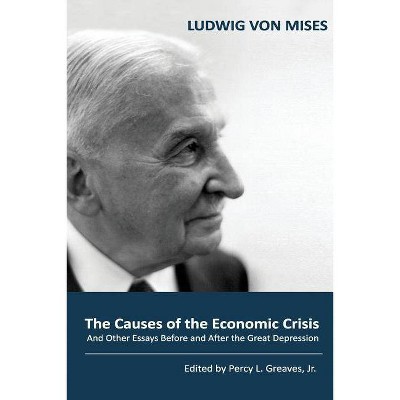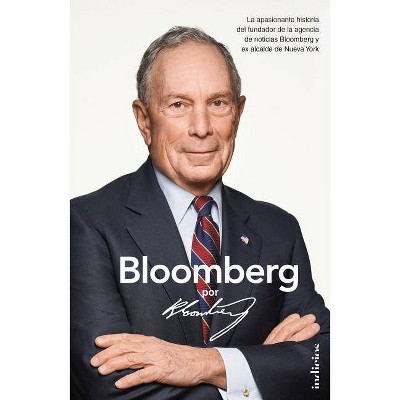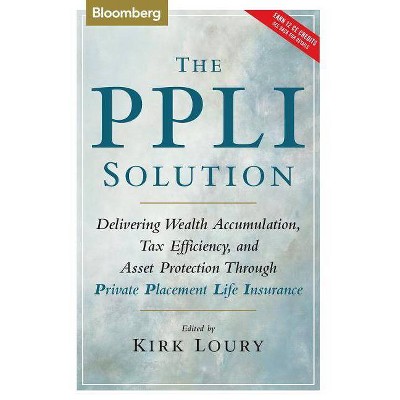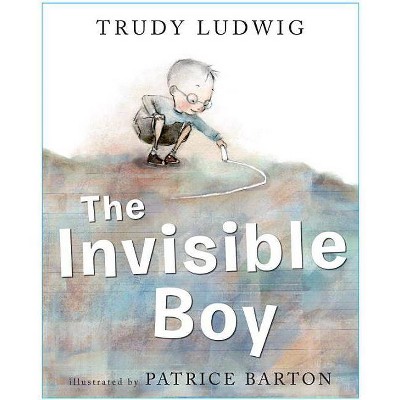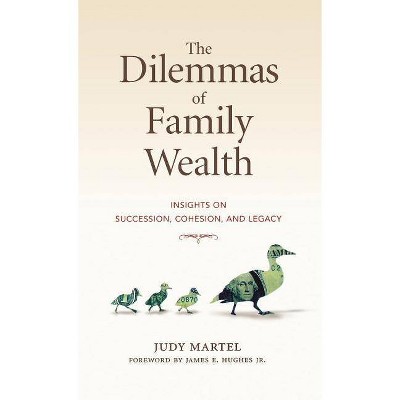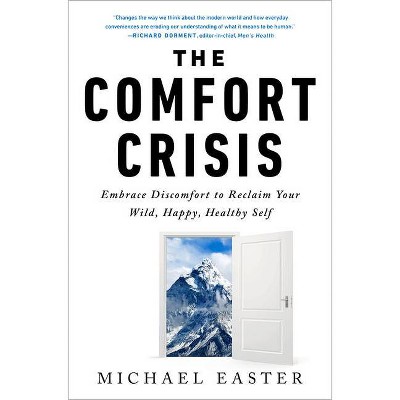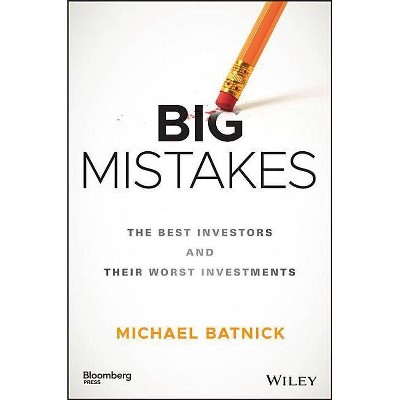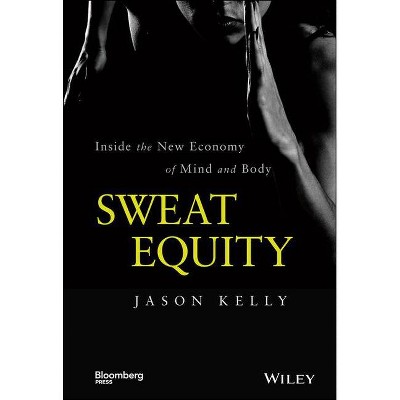The Crisis of Crowding - (Bloomberg) by Ludwig B Chincarini (Hardcover)
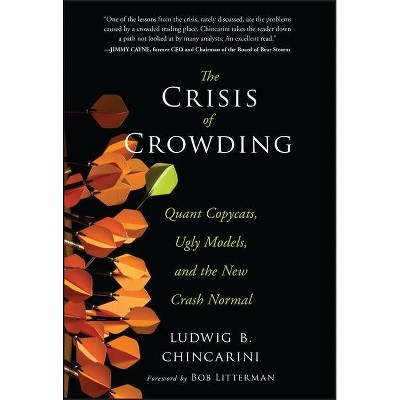
Similar Products
Products of same category from the store
AllProduct info
<p/><br></br><p><b> About the Book </b></p></br></br>"The financial markets are dangerously over-crowded. Investors follow popular trends or latch onto profitable new strategies with herd-like single-mindedness, and an increasingly globalized and interconnected world has only exacerbated the problem. [The author] explores how the dramatic overcrowding we've seen over the last quarter century has yielded terrifying results, including the 2008 financial crisis that continues to reverberate around the globe"--Jacket flap.<p/><br></br><p><b> Book Synopsis </b></p></br></br><b>A rare analytical look at the financial crisis using simple analysis</b> <p>The economic crisis that began in 2008 revealed the numerous problems in our financial system, from the way mortgage loans were produced to the way Wall Street banks leveraged themselves. Curiously enough, however, most of the reasons for the banking collapse are very similar to the reasons that Long-Term Capital Management (LTCM), the largest hedge fund to date, collapsed in 1998. <i>The Crisis of Crowding</i> looks at LTCM in greater detail, with new information, for a more accurate perspective, examining how the subsequent hedge funds started by Meriwether and former partners were destroyed again by the lapse of judgement in allowing Lehman Brothers to fail.</p> <p>Covering the lessons that were ignored during LTCM's collapse but eventually connected to the financial crisis of 2008, the book presents a series of lessons for hedge funds and financial markets, including touching upon the circle of greed from homeowners to real estate agents to politicians to Wall Street.</p> <ul> <li>Guides the reader through the real story of Long-Term Capital Management with accurate descriptions, previously unpublished data, and interviews</li> <li>Describes the lessons that hedge funds, as well as the market, should have learned from LTCM's collapse</li> <li>Explores how the financial crisis and LTCM are a global phenomena rooted in failures to account for risk in crowded spaces with leverage</li> <li>Explains why quantitative finance is essential for every financial institution from risk management to valuation modeling to algorithmic trading</li> <li>Is filled with simple quantitative analysis about the financial crisis, from the Quant Crisis of 2007 to the failure of Lehman Brothers to the Flash Crash of 2010</li> </ul> <p>A unique blend of storytelling and sound quantitative analysis, <i>The Crisis of Crowding</i> is one of the first books to offer an analytical look at the financial crisis rather than just an account of what happened. Also included are a layman's guide to the Dodd-Frank rules and what it means for the future, as well as an evaluation of the Fed's reaction to the crisis, QE1, QE2, and QE3.</p><p/><br></br><p><b> From the Back Cover </b></p></br></br><p>The financial markets are dangerously over- crowded. Investors follow popular trends or latch onto profitable new strategies with herd-like single-mindedness, and an increasingly globalized and interconnected world has only exacerbated the problem. <i>The Crisis of Crowding: Quant Copycats, Ugly Models, and the New Crash Normal</i> explores how the dramatic overcrowding we've seen over the last quarter century has yielded terrifying results, including the 2008 financial crisis that continues to reverberate around the globe. <p>The story of overcrowding as we know it now began in 1998, with the failure of the profoundly successful Long-Term Capital Management (LTCM) hedge fund. Exploring how this seemingly isolated event signaled a much larger problem within the financial industry, <i>The Crisis of Crowding</i> traces the story of LTCM and the subsequent hedge funds started by its founder, John Meriwether and his former partners, through the events of 2008, and up to the ongoing European debt crisis. <p>Part narrative, part quantitative analysis, the book is filled with firsthand recollections from those on the front lines of the crowding crisis, including several LTCM partners. Featuring insights from key banking and hedge fund authorities, it brings the events that led to the current crisis vividly to life, showing how and why the market has evolved in new and dangerous ways, and what can be done about it. <p>Much that should have been obvious after the fall of LTCM could have prevented the crises that followed. Instead, the problems of overcrowding went unchecked so that when the next economic disaster hit, increased leverage, policy mishaps, and an even more crowded trading space resulted in a far bigger collapse. We failed to learn our lesson the first time around, but that doesn't mean it's too late. Future economic crises are all but guaranteed, and <i>The Crisis of Crowding</i> reveals exactly what we need to know so we're prepared for next time.<p/><br></br><p><b> About the Author </b></p></br></br><p><b>LUDWIG B. CHINCARINI, CFA, PHD, </b> is a Professor of Finance in the School of Management at the University of San Francisco and Director of Quantitative Strategies for United States Commodity Funds, with over fifteen years of experience in the financial industry specializing in portfolio management, quantitative equity management, and derivatives. Prior to this, he was creative advisor to Index IQ. He was also Director of Research at Rydex Global Advisors, where he co-developed the S&P 500 equal-weight index and helped launch the Rydex ETF program. He helped build an internet brokerage firm, FOLIO<i>fn</i>, designing its innovative basket trading and portfolio management platform. He also worked at the Bank for International Settlements (BIS) and Schroders. He is the coauthor of <i>Quantitative Equity Portfolio Management</i>. He received a PhD from the Massachusetts Institute of Technology and a BA from the University of California at Berkeley.</p>
Price History
Cheapest price in the interval: 33.99 on October 27, 2021
Most expensive price in the interval: 33.99 on November 8, 2021
Price Archive shows prices from various stores, lets you see history and find the cheapest. There is no actual sale on the website. For all support, inquiry and suggestion messagescommunication@pricearchive.us
